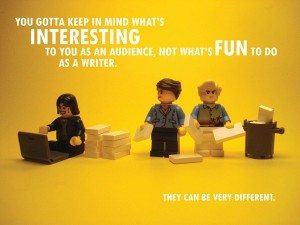 Writing a two-minute TV news story is nothing like writing a screenplay for a movie. Or is it? Truth is, all writing has some things in common. Take this list from Emma Coats, a former screenwriter at Pixar, the movie studio. Of her 22 rules of storytelling, more than a handful apply to the kind of writing we journalists do.
Writing a two-minute TV news story is nothing like writing a screenplay for a movie. Or is it? Truth is, all writing has some things in common. Take this list from Emma Coats, a former screenwriter at Pixar, the movie studio. Of her 22 rules of storytelling, more than a handful apply to the kind of writing we journalists do.
Here’s my slightly edited rundown of favorites from her list:
- Trying for theme is important, but you won’t see what the story is actually about til you’re at the end of it. Now rewrite.
- Once upon a time there was ___. Every day, ___. One day ___. Because of that, ___. Because of that, ___. Until finally ___. And ever since that day, ______.
- Simplify. Focus.
Combine characters. Hop over detours. You’ll feel like you’re losing valuable stuff but it sets you free. - Come up with your ending before you figure out your middle. Seriously. Endings are hard, get yours working up front.
- Finish your story, let go even if it’s not perfect. In an ideal world you have both, but move on. Do better next time.
- When you’re stuck, make a list of what WOULDN’T happen next. Lots of times the material to get you unstuck will show up.
- Pull apart the stories you like. What you like in them is a part of you; you’ve got to recognize it before you can use it.
- Putting it on paper lets you start fixing it. If it stays in your head, a perfect idea, you’ll never share it with anyone.
- Discount the 1st thing that comes to mind. And the 2nd, 3rd, 4th, 5th – get the obvious out of the way. Surprise yourself.
Give[Let] your characters [express] opinions. Passive/malleable might seem likable to you as you write, but it’s poison to the audience.- Why must you tell THIS story? What’s the belief burning within you that your story feeds off of? That’s the heart of it.
- No work is ever wasted. If it’s not working, let go and move on – it’ll come back around to be useful later.
- You have to know yourself: the difference between doing your best & fussing. Story is testing, not refining.
- Exercise: take the building blocks of a
movie[story] you dislike. How d’you rearrange them into what you DO like? - What’s the essence of your story? Most economical telling of it? If you know that, you can build out from there.
More wisdom from the Pixar family comes from Andrew Stanton, who wrote the three Toy Story movies, Wall-E and Finding Nemo. “Storytelling is joke telling,” he says. “It’s knowing your punch line.” And the greatest story commandment, according to Stanton: Make me care. I couldn’t agree more.
Beware: some language in the video is NSFW.
Thanks to Aerogramme Writers’ Studio, a new blog from Australia, for sharing the links!
Originally posted at NewsLab
